Tehran City Council Head Announces Aid For Gaza
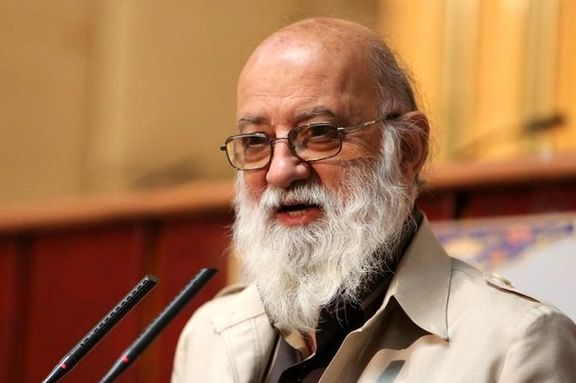
The head of Tehran City Council has announced plans to support the reconstruction of Gaza during an upcoming meeting involving city council leaders.

The head of Tehran City Council has announced plans to support the reconstruction of Gaza during an upcoming meeting involving city council leaders.
Coming amid the ongoing war between Israel and Iran-backed Hamas in Gaza, which Israeli prime minister Benjamin Netanyahu has said will be "long and difficult", Mehdi Chamran said that a meeting is scheduled to discuss “strategies to prevent future Israeli bombings.”
His offer of aid to Hamas-run Gaza comes when ordinary Iranians are struggling to survive as the country grapples with one of its most severe economic crises. The national currency is at a historic low, causing unexpected poverty for tens of millions of Iranians.
Questions about taking the domestic budget abroad will likely raise questions among a population grappling for even the basics such as food and fuel.
The Islamic City Council of Tehran oversees the governance of the capital city. It plays a pivotal role in selecting the mayor and managing the budget of the Municipality of Tehran.
Recent developments have shed light on financial irregularities within the Tehran municipality. In May, Tehran City Council revealed nearly $400 million worth of financial discrepancies, highlighting a history of corruption cases in Tehran's municipal administration.
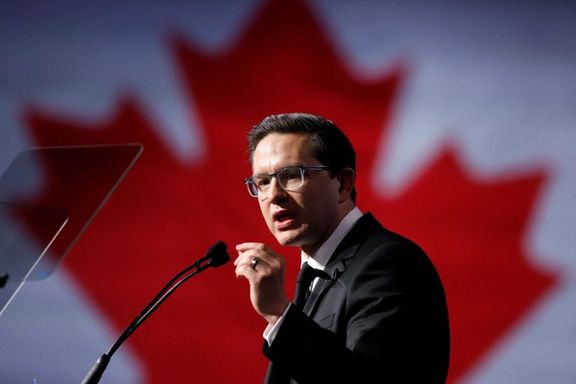
Pierre Poilievre, the leader of Canada’s opposition Conservative Party, blames Iran for Hamas’ massacre of October 7.
Speaking exclusively to Iran International, he said: “I don’t believe that Hamas has the sophistication and coordination to carry out an attack at this scale without major logistical planning and intelligence backing from a government.”
Poilievre called the Iranian regime “the number one state sponsor of terror” and “the most likely culprit” in Hamas’ onslaught on Israel which saw 1,400 mostly civilians murdered and 240 more taken hostage to Gaza.
He also slammed Iran’s Revolutionary Guard (IRGC) for its coordination of Hamas and Hezbollah terror groups, among Iran's network of regional proxies, stressing the need to “criminalize” the IRGC in Canada.
Iranian officials have repeatedly rejected allegations about Tehran’s role in helping Hamas organize its invasion which saw thousands of Hamas fighters invade by air, land and sea in the single most deadly day in Jewish history since the Holocaust.
In an interview with CNN, Iran's Foreign Minister Hossein Amir-Abdollahian claimed that Tehran neither has a proxy group nor runs a proxy war in the region.
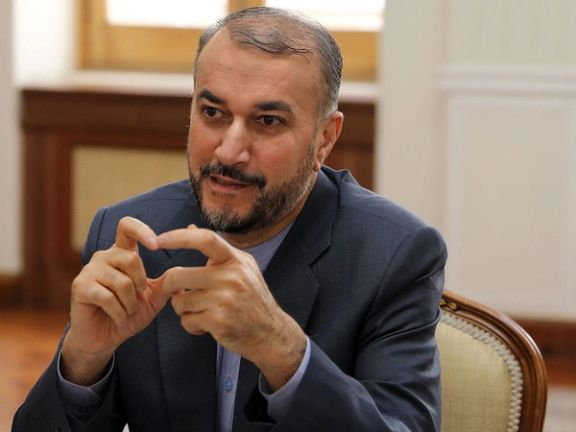
Poilievre took Canadian Prime Minister Justin Trudeau to task for choosing not to list IRGC fully as a terror group and stated that he does not understand the rationale behind the government’s decision. The US designated the IRGC as a whole in 2019 under the Trump administration.
The Conservative party “will not relent until the IRGC is criminalized as a terrorist group in Canada,” Poilievre vowed.
In August, Canada decided to impose sanctions on 170 Iranians and 192 Iranian entities, including IRGC officials.
Then, in November, Prime Minister Justin Trudeau said Canada has designated Iran's IRGC leadership, adding that Canada will “restrict financial transactions with the Islamic Republic of Iran associated with the IRGC and the proxies that support them".
He added: “These actions are some of the strongest measures anywhere against Iran.”
However, Poilievre said that the implementation of these sanctions depends on “how serious the government is.”
It was not the first time the IRGC had been subject to sanctions. In October 2022, in the wake of the Women, Life, Freedom uprising, Canada announced sanctions against IRGC, permanently banning over 10,000 of its officers from entering Canada.
“We will restrict financial transactions with the Islamic Republic of Iran associated with the IRGC and the proxies that support them. These actions are some of the strongest measures anywhere against Iran,” Trudeau said at the time.
However, the opposition leader believes that Trudeau’s government lacks the “law enforcement rigor” to fully implement IRGC sanctions.
Poilievre confirmed the possibility of Tehran’s using Canada as a platform to operate its proxy wars, adding that there are reports about “well-placed regime thugs” in Canada who spend the money that “they stole from the Iranian people.” Western governments including the US and UK are increasingly concerned about regime activity with the UK branding Iran among its top threats and the FBI just revealing that Iran has tried to kill American officials on US soil.
He also called for tightening immigration regulations to ensure that anyone “willingly associated” with the Iranian regime should not be eligible for entry to Canada.
Reiterating his support for the “Woman Life Freedom” movement, he called on Iranians to remain adamant in their pursuit of freedom despite the regime’s mounting crackdown.
“We need a regime change in Tehran. And it will only happen if the people keep fighting. It's a long journey, but don't give up,” he said.
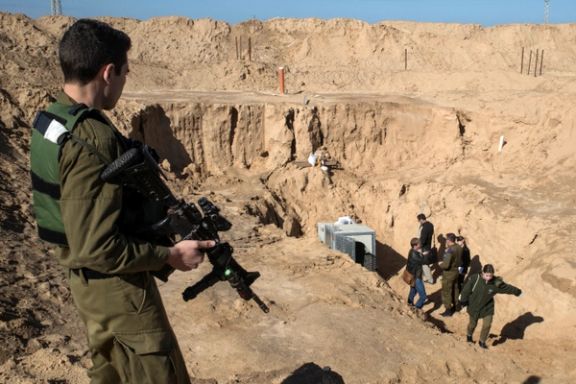
Hamas has built 500 kilometers of tunnels in Gaza, where they have amassed weapons, the commander of IRGC forces in Tehran, Hassan Hassanzadeh has said.
He added that Hamas forces managed to infiltrate up to 40 kilometers into the Israeli territory during their deadly onslaught on October 7, saying it was “a great victory.”
The second victory happened when people in London, Paris and other places held rallies to support the Palestinian cause, the IRGC commander stated.
Recently, the British newspaper The Times reported that Iranian agents are stirring up unrest in the UK through Gaza protests.
There is direct involvement of the Iranian regime through the physical presence of operatives at protests as well as through disinformation campaigns conducted online, the report said.
Hassanzadeh also claimed that Israel’s political and security structures have collapsed following Hamas attack, while the Israeli army is advancing in Gaza.
His remarks came three days after Mohammad Bagheri, the Chief of Staff of Iran's Armed Forces, said that Hamas fighters have constructed over 400 kilometers of tunnels in northern Gaza, describing them as one of the factors that the Islamist militia has survived against Israeli fire.
On October 31, Jam-e Jam daily, close to the Iranian regime, called Hamas tunnels “a labyrinthine puzzle” that cannot be solved by American and Israeli security and military circles.
These tunnels provide Hamas with a great advantage in any ground battle with Israeli forces, added the report.
The clashes between the two sides started when the Hamas terror group launched a surprise attack on Israel on October 7, killing at least 1400 people.
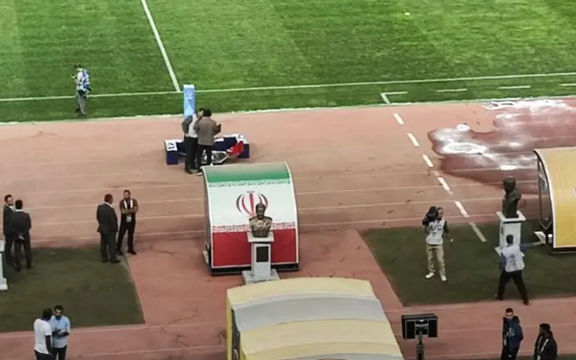
Iran's Sepahan has been penalized with a 3-0 loss as a result of its displaying a bust of IRGC commander Qassem Soleimani for a match against Saudi's Al Ittihad.
The match, which was scheduled to take place last month, took an unexpected turn when the Saudi team abruptly left the field just before kickoff in protest at the display of the former IRGC Quds Force Commander on the sidelines. The team was also fined $200,000 for the incident that left the team shamed on the global stage.
Qassem Soleimani, responsible for Iran's proxy forces in the region, was killed in a US drone strike near Baghdad International Airport in 2020. Then-President Donald Trump claimed that the military commander had been actively planning attacks on American diplomats, service members, and administration officials in the region.
Ali Karimi, a former soccer legend and an outspoken critic of the regime said that even after his death, Soleimani inflicts costs on the Iranian people.
In a further blow to Sepahan, the team was also banned from hosting its next three Asian Champions League matches at home.
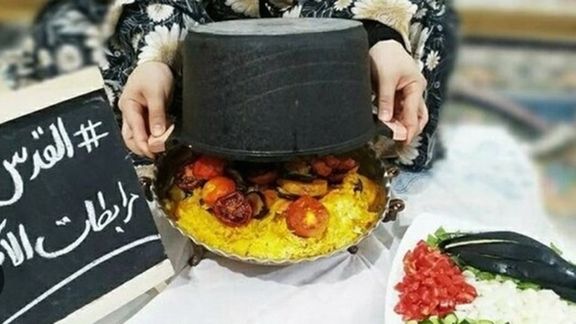
Pro-government women in Iran are cooking the famous Levantine ‘upside down’ dish of maqluba to “instil fear” into Israel amid the war in Gaza.
In the latest regime campaign against its archenemy Israel which is currently fighting the Iran-backed Hamas militia, regime posters offer the “Invitation to Turn Pots to Instil Fear In Israelis”. An image shows a Palestinian woman turning a pot of rice on a platter outside Al-Aqsa Mosque in Jerusalem.
The ‘maqluba campaign’ is the latest in a string of propaganda stunts from the Islamic Republic and has been amplified following Hamas' October 7 invasion of Israel which has led to the worst war in Gaza since the proscribed terror group took over in 2007.
“Tehrani women … will express their support for mothers in Gaza by cooking the most political dish in the world,” hardliner journalist Mahdi Shakibaei tweeted while another promoter of the campaign said cooking maqluba in the heart of Tehran bears the message that “the Zionist regime is doomed to destruction.”
Meanwhile, Iranian leaders continue to issue threats to escalate the war while the regime's regional proxies in Iraq, Syria, Lebanon and Yemen continue to send attacks towards Israel and US targets in the region.
The maqluba campaign has been mocked by many of the Iranian public. “May God have mercy on us. I think Iran will have the most casualties in the defense of Gaza. First not drinking Coca Cola and Pepsi and now eating maqluba. The people of Gaza would be indebted to [Iranians] for these sacrifices till the end of time,” another sarcastic tweet said.
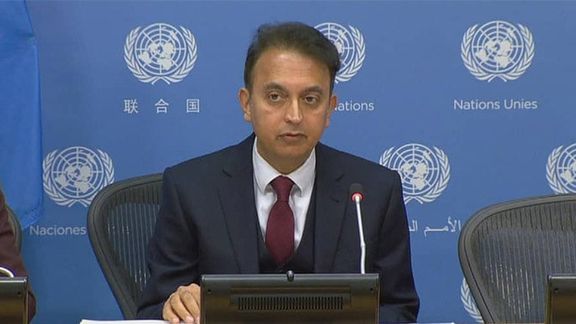
The UN special rapporteur on human rights in Iran, Javaid Rehman, says the Israel-Gaza War bolsters "repression" inside Iran by deflecting attention from internal criticism of the regime.
The comments come as Iran prepares to chair the UN Human Rights Council Social Forum which will come into effect today, a move which has garnered global outrage.
"Given the current crisis, they [Iran] feel even more emboldened because they believe they have succeeded in diverting attention from internal criticism and internal repression, by becoming or claiming to have become virulent defenders... of the Palestinian movement," Rehman said at a roundtable hosted by the National Union for Democracy in Iran (NUFDI) in Washington Tuesday.
Iran-backed Hamas declared war on Israel on October 7, invading by air, land and sea, and killing 1,400 mostly civilians. Another 240 were kidnapped to Gaza including babies and the elderly.
The regime has since rallied its proxies in the region to support Hamas in Gaza, with military action coming from groups in Iraq, Syria, Lebanon and Yemen since war broke out.
The UN Human Rights Rapporteur for Iran, who has never been allowed by the regime to visit the country since his appointment in July 2018, also pointed out that the leaders of the Islamic Republic had already been planning to intensify repression in the country before the war started.
Rehman also said the regime has “lost credibility” since the protests sparked by the death in custody of the 22-year-old Mahsa Amini in September 2022 that sparked protests across the country for months in the worst uprising since the 1979 revolution. Hundreds of civilians were killed by state security and tens of thousands more arbitrarily arrested, with dozens more executed.
“The problems with the existing constitutional and legal provisions are that they are subject to politically engineered criteria or the application of State ideology, which also results in the failure to engage in democratic dialogue and the inability to introduce incremental reforms,” Rehman said in his report to the UN General Assembly last week, adding that the situation had led to widespread public distrust and protests that were violently repressed.
In a letter to the UN Secretary General Antonio Guterres earlier this week, Iran's Nobel Peace Laureate Narges Mohammadi urged the UN to cancel Iran's appointment to the chair of the UN Human Rights Council Social Forum.
“The religious fundamentalist regime of Iran opposes the foundations of democracy and human rights, especially women's rights, and sees its survival in internal repression as well as creating crisis and disrupting the stability, security and peace of the region and the world,” Mohammadi wrote in her letter.
“The presidency of such a regime over the UN Human Rights Council Social Forum which is a human rights supporting body is perplexing and disappointing,” she wrote, adding that it is expected that the Islamic Republic is “decisively and with clarity removed from this position.”
Offering the position of chair also contradicts an investigation launched by the UN last year into the human rights abuses witnessed during crackdowns on protesters. The UN responded by saying "the chairmanship rotates regionally, in consistency with established UN procedures".